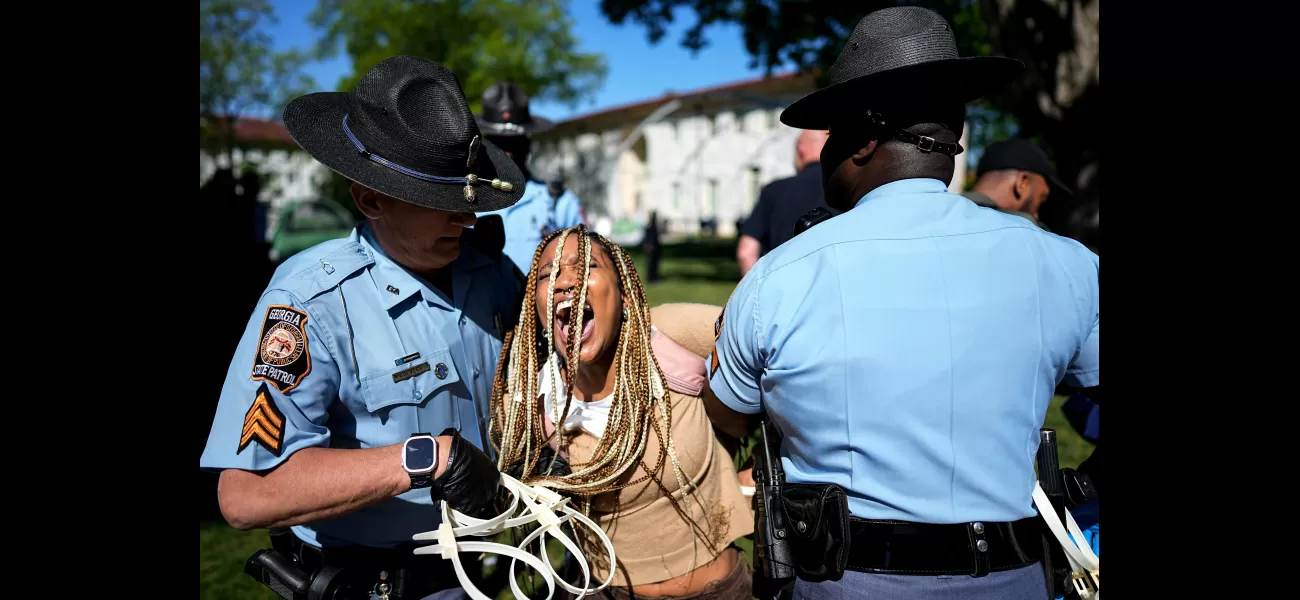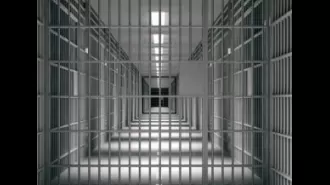Students demonstrating seek 'forgiveness.' Issues include school fees, judicial accusations, academic standing and commencement.
Students arrested, suspended, and facing consequences for participating in pro-Palestinian protests across the U.S. as schools and law enforcement decide their fate.
April 28th 2024.

It all started when Maryam Alwan, a junior at Columbia University, joined a protest against the Israel-Hamas war on the campus. She, along with other students, was arrested by the New York City police in riot gear. They were then loaded onto buses and held in custody for hours. Alwan thought it was all over when she was released, but little did she know that the next evening, she would receive an email from the university stating that she and other students were being suspended due to their participation in the protest.
This tactic, known as the "Gaza Solidarity Encampment," has been used by colleges across the country to quell the growing campus protests against the Israel-Hamas war. The students' situation has become a central part of the protests, with students and faculty demanding their amnesty. The main concern is whether the universities and law enforcement will drop the charges and refrain from imposing any other consequences, or if the suspensions and legal records will have a long-lasting impact on the students' adult lives.
The terms of the suspensions vary from campus to campus. At Columbia and its affiliated Barnard College, Alwan and dozens of other students were arrested on April 18 and promptly barred from campus, classes, and even virtual learning. They were also banned from dining halls. The students are now left with questions about their academic futures. Will they be able to take their final exams? What about their financial aid and graduation? While Columbia has stated that these outcomes will be decided at disciplinary hearings, Alwan says she has not been given a date for hers yet.
For Alwan, who is majoring in comparative literature and society, the whole situation feels surreal and almost dystopian. What started at Columbia has now turned into a nationwide standoff between students and administrators over anti-war protests and the limits of free speech. In the past 10 days, hundreds of students from various colleges, including Yale University, the University of Southern California, Vanderbilt University, and the University of Minnesota, have been arrested, suspended, put on probation, and in rare cases, even expelled.
Barnard, a women's liberal arts college at Columbia, suspended over 50 students who were arrested on April 18 and evicted them from campus housing. However, on Friday, the college announced that it had reached agreements with "nearly all" of the students, restoring their campus access. The college's statement did not specify the exact number, but it did mention that the students who had their suspensions lifted have agreed to follow the college's rules and, in some cases, have been put on probation.
However, on the night of the arrests, Barnard student Maryam Iqbal received a rather unsettling email from a dean. The email stated that she could briefly return to her room with campus security before being kicked out. "You will have 15 minutes to gather what you might need," the email read. This incident further fueled the fire for the more than 100 Barnard and Columbia faculty members who staged a "Rally to Support Our Students" last week, condemning the student arrests and demanding that the suspensions be lifted.
Meanwhile, Columbia University is still trying to remove the tent encampment on the main campus lawn, where graduation is set to be held on May 15. The students have demanded that the school cut ties with Israel-linked companies and ensure amnesty for all students and faculty who have been arrested or disciplined in connection with the protests. Talks between the student protesters and the university are ongoing, with a spokesperson stating that "we have our demands, and they have theirs."
The situation is particularly concerning for international students, who fear that the suspensions may lead to them losing their visas. According to Radhika Sainath, an attorney with Palestine Legal, which helped a group of Columbia students file a federal civil rights complaint against the school, this level of punishment not only feels draconian but also exhibits a sense of over-the-top callousness.
At Yale University, more than 40 students were arrested at a demonstration last week, including senior Craig Birckhead-Morton. He is set to graduate on May 20, but he says the university has not yet informed him if his case will be brought before a disciplinary panel. Birckhead-Morton is worried about whether he will receive his diploma and if his acceptance to Columbia graduate school could be at risk. He feels that the school has been ignoring the students and not providing them with any information about what will happen next.
Across the country, college administrators are struggling to find a balance between free speech and inclusivity. Some protests have included hate speech, anti-Semitic threats, or support for Hamas, the group responsible for the attack on Israel that sparked the war in Gaza, resulting in the death of over 34,000 people. The upcoming commencement ceremonies have added pressure to clear the demonstrations. University officials have stated that arrests and suspensions are a last resort, and that they give ample warnings beforehand to clear the protest areas.
Vanderbilt University in Tennessee has issued what is believed to be the only student expulsions related to protesting the Israel-Hamas conflict, according to the Institute for Middle Eastern Understanding. During a demonstration on March 26, more than two dozen students occupied the university chancellor's office for several hours, prompting the university to summon police and arrest several protesters. As a result, Vanderbilt issued three expulsions, one suspension, and put 22 protesters on probation.
In an open letter to Chancellor Daniel Diermeier, over 150 Vanderbilt professors criticized the university's crackdown as "excessive and punitive." Freshman Jack Petocz, one of the students expelled, is currently allowed to attend classes while he appeals the decision. However, he has been evicted from his dorm and is now living off-campus. Petocz regrets that advocating for Palestinian liberation has led to such severe consequences, especially since his activism in high school helped him get into Vanderbilt and secure a merit scholarship for activists and organizers. His college essay was about organizing walkouts in rural Florida to protest against Governor Ron DeSantis' anti-LGBTQ policies. "Vanderbilt seemed to love that," Petocz said. "Unfortunately, when it comes to advocating for Palestinian liberation, they draw the line."
This tactic, known as the "Gaza Solidarity Encampment," has been used by colleges across the country to quell the growing campus protests against the Israel-Hamas war. The students' situation has become a central part of the protests, with students and faculty demanding their amnesty. The main concern is whether the universities and law enforcement will drop the charges and refrain from imposing any other consequences, or if the suspensions and legal records will have a long-lasting impact on the students' adult lives.
The terms of the suspensions vary from campus to campus. At Columbia and its affiliated Barnard College, Alwan and dozens of other students were arrested on April 18 and promptly barred from campus, classes, and even virtual learning. They were also banned from dining halls. The students are now left with questions about their academic futures. Will they be able to take their final exams? What about their financial aid and graduation? While Columbia has stated that these outcomes will be decided at disciplinary hearings, Alwan says she has not been given a date for hers yet.
For Alwan, who is majoring in comparative literature and society, the whole situation feels surreal and almost dystopian. What started at Columbia has now turned into a nationwide standoff between students and administrators over anti-war protests and the limits of free speech. In the past 10 days, hundreds of students from various colleges, including Yale University, the University of Southern California, Vanderbilt University, and the University of Minnesota, have been arrested, suspended, put on probation, and in rare cases, even expelled.
Barnard, a women's liberal arts college at Columbia, suspended over 50 students who were arrested on April 18 and evicted them from campus housing. However, on Friday, the college announced that it had reached agreements with "nearly all" of the students, restoring their campus access. The college's statement did not specify the exact number, but it did mention that the students who had their suspensions lifted have agreed to follow the college's rules and, in some cases, have been put on probation.
However, on the night of the arrests, Barnard student Maryam Iqbal received a rather unsettling email from a dean. The email stated that she could briefly return to her room with campus security before being kicked out. "You will have 15 minutes to gather what you might need," the email read. This incident further fueled the fire for the more than 100 Barnard and Columbia faculty members who staged a "Rally to Support Our Students" last week, condemning the student arrests and demanding that the suspensions be lifted.
Meanwhile, Columbia University is still trying to remove the tent encampment on the main campus lawn, where graduation is set to be held on May 15. The students have demanded that the school cut ties with Israel-linked companies and ensure amnesty for all students and faculty who have been arrested or disciplined in connection with the protests. Talks between the student protesters and the university are ongoing, with a spokesperson stating that "we have our demands, and they have theirs."
The situation is particularly concerning for international students, who fear that the suspensions may lead to them losing their visas. According to Radhika Sainath, an attorney with Palestine Legal, which helped a group of Columbia students file a federal civil rights complaint against the school, this level of punishment not only feels draconian but also exhibits a sense of over-the-top callousness.
At Yale University, more than 40 students were arrested at a demonstration last week, including senior Craig Birckhead-Morton. He is set to graduate on May 20, but he says the university has not yet informed him if his case will be brought before a disciplinary panel. Birckhead-Morton is worried about whether he will receive his diploma and if his acceptance to Columbia graduate school could be at risk. He feels that the school has been ignoring the students and not providing them with any information about what will happen next.
Across the country, college administrators are struggling to find a balance between free speech and inclusivity. Some protests have included hate speech, anti-Semitic threats, or support for Hamas, the group responsible for the attack on Israel that sparked the war in Gaza, resulting in the death of over 34,000 people. The upcoming commencement ceremonies have added pressure to clear the demonstrations. University officials have stated that arrests and suspensions are a last resort, and that they give ample warnings beforehand to clear the protest areas.
Vanderbilt University in Tennessee has issued what is believed to be the only student expulsions related to protesting the Israel-Hamas conflict, according to the Institute for Middle Eastern Understanding. During a demonstration on March 26, more than two dozen students occupied the university chancellor's office for several hours, prompting the university to summon police and arrest several protesters. As a result, Vanderbilt issued three expulsions, one suspension, and put 22 protesters on probation.
In an open letter to Chancellor Daniel Diermeier, over 150 Vanderbilt professors criticized the university's crackdown as "excessive and punitive." Freshman Jack Petocz, one of the students expelled, is currently allowed to attend classes while he appeals the decision. However, he has been evicted from his dorm and is now living off-campus. Petocz regrets that advocating for Palestinian liberation has led to such severe consequences, especially since his activism in high school helped him get into Vanderbilt and secure a merit scholarship for activists and organizers. His college essay was about organizing walkouts in rural Florida to protest against Governor Ron DeSantis' anti-LGBTQ policies. "Vanderbilt seemed to love that," Petocz said. "Unfortunately, when it comes to advocating for Palestinian liberation, they draw the line."
[This article has been trending online recently and has been generated with AI. Your feed is customized.]
[Generative AI is experimental.]
0
0
Submit Comment





